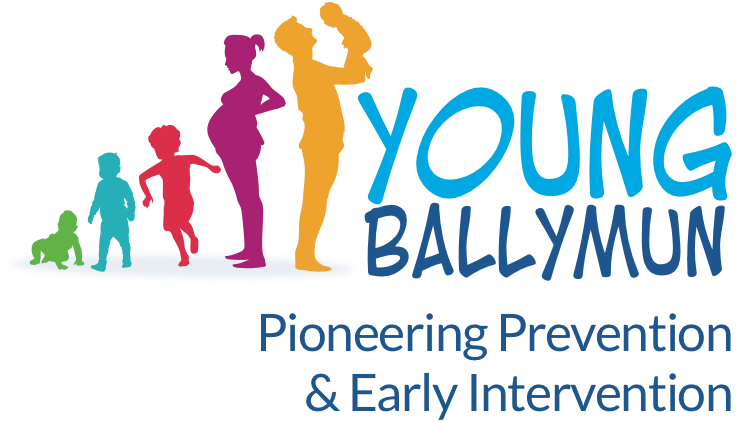The 12 Area Based Childhood (ABC) initiatives, including Dublin based Youngballymun attended a national showcase on what has been achieved to date and to plan for the future.

Attending a national showcase to share learning and plan for the future of the Area Based Childhood (ABC) Programme were Youngballymun staff including, Fiona Gallagher, Manager; Jen Curtis, Parent & Practitioner; Hazel Murphy & Mary Fanning; Infant Mental Health Co-ordinators. The event enabled the 12 local initiatives who comprise the ABC Programme to present their work, which is focused on delivering prevention and early intervention programmes to support young families.
Youngballymun presented an information stand on its work led by Manager, Fiona Gallagher.
The event enabled all of the initiatives who comprise the ABC Programme to exhibit their work, which is focused on delivering prevention and early intervention programmes to support young families.
Youngballymun Manager, Fiona Gallagher said it was of great value to present the work delivered in Ballymun and to also learn about the work of the 11 other initiatives.
“Since 2007, Youngballymun has delivered evidence-based prevention and early intervention programmes, initially as part of the Prevention and Early Intervention Programme (PEIP) 2007-2013 and now as part of the ABC Programme. Thousands of parents, children and practitioners have benefitted from Youngballymun supports and services since then.”
“It has been very valuable to learn what other initiatives have achieved, within their communities, and what has worked best. It is also very important that as colleagues we agree a shared view on how to take this work into the future for the benefit of as many families as possible.”
Prevention means developing strengths, supports and strategies to prevent a problem from arising. Early Intervention means anticipating, identifying and addressing problems as they arise or escalate.
Each of the ABC’s provide high-quality, evidence–based supports, working with statutory and community organisations to achieve better outcomes for children and their families. These include parenting, literacy, health and education programmes.
Looking to the future it was discussed that the ABC Programme should have a strong focus on Child Poverty – working together with the DCYA, Tusla and the UNESCO Child & Family Research Centre at NUI Galway.
The 12 local initiatives which comprise the ABC Programme are: Better Finglas (Finglas), Blue Skies (Clondalkin), Childhood Development Initiative (Tallaght West), Early Learning Initiative (Dublin Docklands / East Inner City), Family Matters (Ballyfermot / Chapelizod), The Genesis Programme (Louth), Preparing for Life (Dublin 15 & 17), Start Right (Limerick City), Supporting Parents and Early Childhood Services SPECS (Bray), Grangegorman ABC (Grangegorman), Youngballymun (Ballymun), Young Knocknaheeny (Cork Northside).
The initiatives are all members of the Prevention and Early Intervention Network (PEIN) which is currently developing a Framework on how Outcomes will be measured in future programmes.
The ABC Programme is funded by the Department of Children & Youth Affairs (DCYA) and aligned with Tusla through the Prevention, Partnership & Family Support (PPFS) Programme.
The findings of the National Evaluation of the ABC Programme 2013-2017, carried out by the Centre for Effective Services (CES) was published last year. It found a positive contribution across the 12 initiatives and identified the following benefits:
- Improved child-parent relationships: Parents reported improvements in their relationship with their child, including increased closeness and reduced conflict; improvements in the social and emotional well-being of their children; a reduction in their own levels of stress; and increased capacity to manage discipline and set boundaries with their children.
- Improved children’s learning and school readiness: Early years practitioners reported reduced social and emotional difficulties for children aged two to four years and for children aged four years and older, as well as improved home learning environments.
- Improved children’s social and emotional well-being: Teachers reported improvements in the social and emotional well-being of children; improvements were most significant among children who began with the greatest behavioural difficulties.
Furthermore, service provision in localities where the initiatives are based was found to have changed in three main ways:
- ABC areas have adapted existing interventions; and practitioners have adopted new ways of working, or changed how they work.
- Local and national stakeholders reported increased capacity among practitioners for collecting evidence and data; larger volumes of evidence and data available within the ABC areas; and improvements in planning and service delivery through the systematic use of evidence and data.
- Local stakeholders reported positive changes to interagency working at both the practitioner-to-practitioner and agency-to-agency levels. The consortium structure and the role of the lead agency were reported to have facilitated interagency working.
Further Information
Youngballymun Manager, Fiona Gallagher: Tel 086 8189041 or email fiona@youngballymun.org
Twitter: #ABCProgramme

